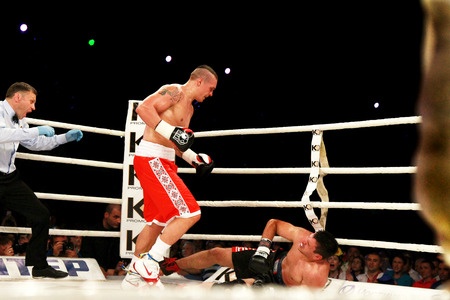
Approved for sale over one year ago, Palcohol may never make it to the shelves of retail stores for sale. Palcohol is a powdered alcohol product that puts the equivalent of one ounce of alcohol in a vacuum-sealed packet. Mix it with about five ounces of water, and voila! Instant cocktail! Mark Phillips, the creator of Palcohol, calls it “a revolutionary product.” He envisions it not only as a recreational beverage, but as also having industrial applications in products like windshield wiper fluid. And it could have military and medical applications. Unfortunately, it seems that unintentionally the makers of Palcohol may have been their own worst enemy.
The company’s website originally described Palcohol as a solution for problems like the overpriced drinks at stadium events. Supposedly, the site’s content was not meant for public viewing; the website was still in process. Then in April of 2014, U.S. Alcohol and Tobacco Tax and Trade Bureau (TTB) announced the approval of Palcohol. The result was a firestorm with a literal political backlash when people discovered the not-quite-ready website. The initial talking points were acknowledged by Phillips to have been “edgy” and “questionable.” Gawker quoted several of these now removed talking points:
What’s worse than going to a concert, sporting event, etc. and having to pay $10, $15, $20 for a mixed drink with tax and tip. Are you kidding me?! Take Palcohol into the venue and enjoy a mixed drink for a fraction of the cost.
We’ve been talking about drinks so far. But we have found adding Palcohol to food is so much fun. Sprinkle Palcohol on almost any dish and give it an extra kick.
Let’s talk about the elephant in the room … snorting Palcohol. Yes, you can snort it. And you’ll get drunk almost instantly because the alcohol will be absorbed so quickly in your nose. Good idea? No. It will mess you up. Use Palcohol responsibly.
Almost immediately, Phillips and his company, Lipsmark LLC, began backpedaling. Eater quoted Phillips as saying the company added “volume to the powder so that it would take more than a half of a cup of powder to get the equivalent of one drink up your nose.” The approval was quickly pulled for packaging discrepancies. In March of 2015 the TTB again approved Palcohol, but Senator Charles Schumer introduced legislation to make the production, sale and possession of powdered alcohol illegal. He also called on the FDA to immediately step in and halt the sale of Palcohol. Schumer said:
Underage alcohol abuse is already an epidemic with tragic consequences. A product like Palcohol would just exacerbate that scourge, which is why we must stop it. Support for this new amendment is the only way to make it illegal to produce or sell this Kool-Aid for underage binge drinking.
The Palcohol website touts its product as “safer than liquid alcohol.” Embedded there is a 16-minute YouTube video of Mark Phillips on “The Truth About Palcohol.” Among the potential benefits of Palcohol he described was how it could be used as an emergency fuel source—in other words, it’s flammable. Hotels in Hawaii and airlines were reportedly interested as it could save shipping and fuel costs, as Palcohol was only 1/3 the weight of regular alcohol. I could see the benefit in shipping alcohol to Hawaii, but won’t airlines have to carry water to hydrate the Palcohol on flights? Doesn’t that negate the weight savings? Claiming that Palcohol could help reduce the amount of greenhouse gas emissions—by saving fuel costs over shipping liquid alcohol—seemed a bit of a stretch. The website also says:
A proposed ban of powdered alcohol … is denying millions of responsible adults and hundreds of businesses a chance to use this legal, safe and revolutionary new product that has applications in medicine, energy, hospitality, the military, manufacturing, etc. as well as reducing the carbon footprint by being so much lighter to ship than liquid alcohol.
Legislators who are working to make Palcohol illegal are made out to be the villains. “The legislature is there to protect the citizen’s right to choose and support innovative business ideas, not to impose [their] values on them.” Weren’t the initial concerns for Palcohol generated from their own “edgy” copy on a not-ready-for-prime-time website? And don’t individual states have the right to ban products they don’t want to be sold in their states? In the video, Phillips said: “We need to act now before ignorance determines our future.”
However, it doesn’t seem that state legislators around the country are as ignorant of Palcohol as Phillips would like. Alcohol Justice reported on PR Newswire that 31 states have complete bans on powered alcohol, with the California Assembly unanimously passing a bill (AB 1554) to do the same. A companion bill unanimously passed the state Senate in March of 2016. Assembly member Jacqui Irwin, author of AB 1554, noted the overwhelming bi-partisan support behind the ban. She said:
Powdered alcohol is a dangerous product that has been designed and marketed as a way to make super-charged cocktails on the go. Binge drinking and alcohol related deaths are already a huge problem in California and adding powdered alcohol to the mix is a recipe for disaster.
Bruce Livingston, the CEO of Alcohol Justice, said they were grateful to the states that placed public health and safety above commerce. He encouraged elected leaders in states that have not yet taken action to do so. “We continue to agree with New York Senator Chuck Schumer who said Palcohol will become the ‘Kool-Aid’ of teenage binge drinking and will lead to acute alcohol poisoning and death.” A graphic on the Alcohol Justice website indicated that as of june 7, 2016, 32 states had banned powered alcohol. Ten states, including California, Pennsylvania and New York, have pending legislation to ban powered alcohol. Only three states allow powered alcohol: Colorado, Arizona and Texas.
Then on June 14, 2016, the American Medical Association (AMA) announced they were adopting a policy supporting the federal and state laws banning powered alcohol in the U.S. Jesse Ehrenfield, MD, an AMA board member said:
Given the variety of flavors that could be enticing to youth and concerns that the final alcohol concentration could be much greater than intended by the manufacturer, we believe that powdered alcohol has the potential to cause serious harm to minors and should be banned. . . . We urge states and the federal government to prevent powdered alcohol from being manufactured, distributed, imported and sold in the U.S.
Mark Phillips told Medscape Medical News that he thought the AMA’s decision was irresponsible. He said: “If the AMA would have taken the time to learn about the product, they would have realized that Palcohol is safer than liquid alcohol.” Reporting for Medscape, Robert Lowes said the AMA’s Council on Science and Public Health weighed Phillips’ arguments for Palcohol and still decided to support the ban: “”The harms that could arise from mixing powdered alcohol with liquid alcohol or even with energy drinks raises the potential for dangerous patterns of use.”
Palcohol is not down for the count just yet. Phillips and Lipsmark LLC are working hard to reverse the legislative bans and present Palcohol as an eco-friendly, potentially life-saving product that happens to be flammable and could be used by the military for “applications from transport fuel to fuel in a soldier’s backpack.” Is that military product going to be powered ethyl alcohol like recreational Palcohol? If it is, I wonder what the alcohol content will be? Do we want to send troops into combat situations with something they could potentially get drunk on? For more on powered alcohol see, “Hype over Powered Alcohol.”





